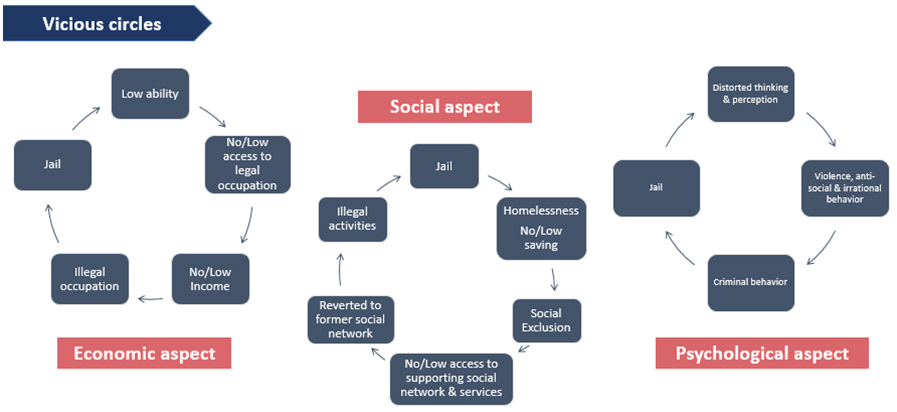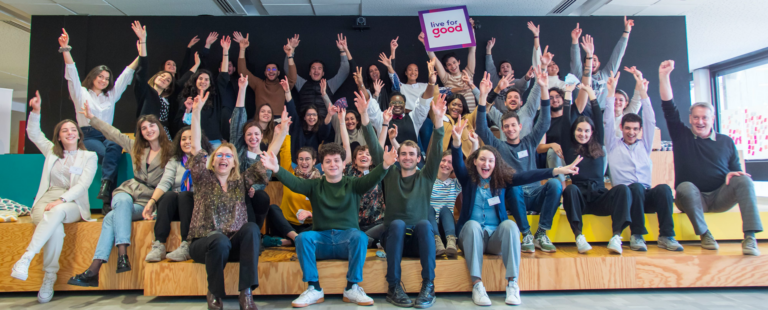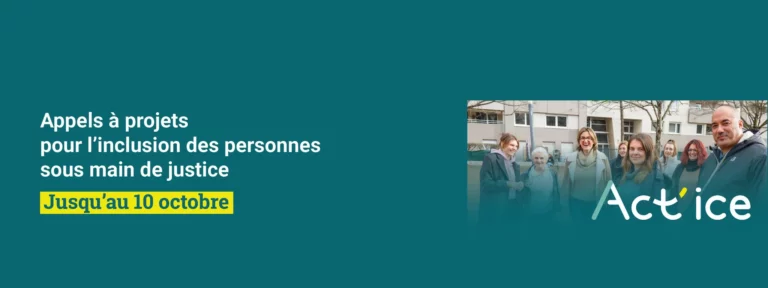Getting off of prison and back to society is not easy, and former inmates face an array of challenges. Basic needs have to be met, and the person is expected to have acquired self-management and life skills allowing for normal social relations, and better employability. Though, the current jail system, far from adding social and human capital, is doing just the opposite. About 80% of young inmates does not receive suitable services, which range from provision of documentation, transportation, food and clothing upon release, housing support, employment and education to healthcare and social support services, which can help them into successful transition(3).
From / Current Situation:

For the remaining 20%, the services that are offered are often incomplete. The needs of an inmate at the moment of release are complex, and touch on several spheres: economic, social and psychological. A training or education in jail may be pivotal to land a job opportunity, which in turn is conditional on healthy psychological conditions of the inmate. Those, in turn, are very difficult to achieve without normal contacts with his or her family/community or if stigmatized by society. We must strive, then, to create a virtuous cycle which is actually the result of many, complementary virtuous cycles, as it is possible to observe in the graph below.
To / Forward Model:

Breadth and depth of service can actually be achieved, provided that different stakeholders – penitentiary administration, service providers and the public- collaborate together. In particular, the prison staff is the first and foremost actor in working with inmates; their attitudes and behaviors are pivotal to ensure a smooth transition and they should play a proactive role.
Besides, in order to overturn the mindset of the public towards ex-offenders and engage them back into the community, mentorship is critical. We need to ensure that an ex-offender has a large number of mentors so that they can reach out for help and advices at any moment on their integration journey. It is also important to categorize mentorship into psychological counselling and skills coaching. Psychological counselling offers ex-offenders supports on dealing with problems and difficulties in their daily lives, often can be carried out by youth and/or volunteers. Psychological counselling offers ex-offenders supports on dealing with problems and difficulties in their daily lives (at least one-third of inmates in Europe have either addiction, violence of psychic related issues and this number can reach to 70% in countries like US and Canada(4)), often can be carried out by youth and/or volunteers. Skills coaching help to develop ex-offenders’ skills and abilities, and to boost performance in their professional lives.
In certain cases, the universe of needs that are to be addressed to successfully get back to society may not be property tackled in jails. For example, drug addiction is better tackled in hospitals than in jails. The pilot project aiming to reinsert illegal immigrants, homeless, people with delinquent behaviors due to psychic disorders by Médecins du Monde (Ailsi) which will be launched in Marseille in 2020 offers a good model of an alternative to jail.
Reintegration underscores the understanding of the complexity of the needs of the inmate and a better dealing with them, and that includes envisioning alternatives to jails. Sounds expensive for “undeserving criminals”? The cost of providing such services for inmates is often significantly less than the cost of incarceration. Typically such programs cost €35,000 -50,000 per year per inmate while reoffending is estimated to cost up to €75,000-90,000(5). In a nutshell, just from an economic perspective, ensuring young inmates suitable integration services and support is worth considering.
By Fondation Demeter and a Team of Students from Sciences-Po Team Projects (Pietro Desideri; Ha My Nguyen; Tanya Kak; Julio Daly)
(1) Source Assemblée nationale
(2) Source Researchgate.net
(3) Source Nouvelobs.com
(4) Source dda.europa.eu
(5) Data provided by the Demeter Foundation



